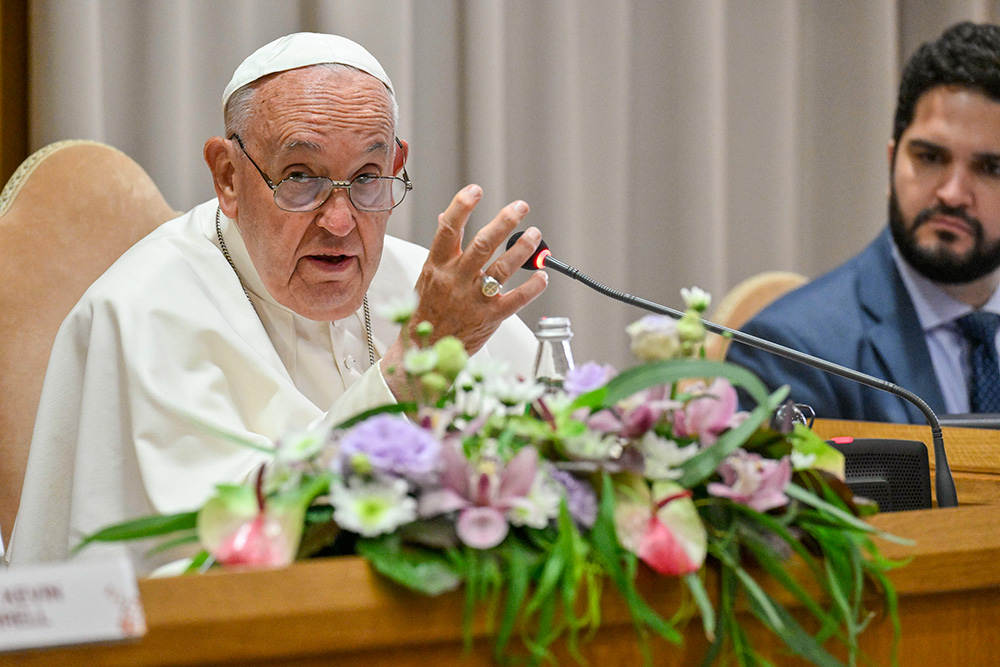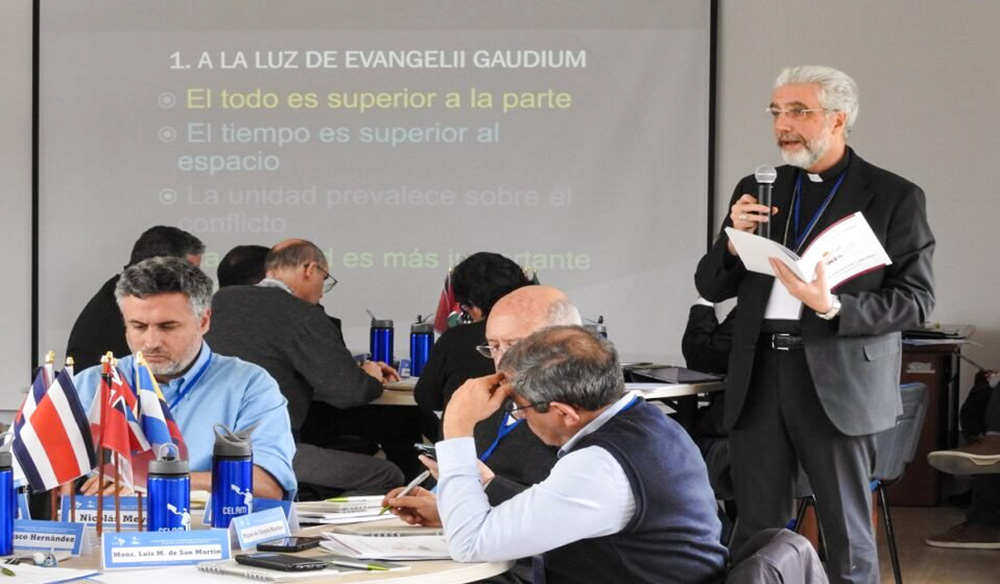
Pope Francis speaks to participants in a conference of moderators of associations of the faithful, ecclesial movements and new movements in the New Synod Hall at the Vatican June 13. (CNS/Vatican Media)
The delegates to the synod on synodality are assembled today and tomorrow for a retreat. Tomorrow, at the close of the retreat, the Holy Father will lead a penitential service and the next day the synod itself will open with Holy Mass.
This second session of the synod will conclude what is likely the largest consultation in the history of the world, conducted in parishes and dioceses, at the national and continental levels, and now concluding with a second global gathering in Rome.
Why does everyone think it will be a yawn? Because the "hot-button" issues, the stuff that makes for headlines, are now being studied by 10 working groups the pope established, and they are working independently of the synodal process.
For those who are as interested in ecclesiology as in ethics, the synod will not be a yawn. It will be a further step in the process of receiving the teachings of the 1962-65 Second Vatican Council.
As I noted when the instrumentum laboris, or working document, first came out, the goal of this gathering "is to get the entire church focused on its mission of proclaiming the Gospel in the world today," to place our ethical teachings and charitable work in a specifically ecclesial context, to remind ourselves that it is the Lord who initiates the work of the church, not us. We are mere workers in the vineyard.
There is plenty to do in that vineyard! The instrumentum laboris states in one of my favorite passages:
In an age marked by increasing inequalities, growing disillusionment with traditional models of governance, democratic disenchantment and the dominance of the market model in human interactions, and the temptation to resolve conflicts by force rather than dialogue, synodality could offer inspiration for the future of our societies. Its attractiveness stems from the fact that it is not a management strategy but a practice to be lived and celebrated in a spirit of gratitude.
We start with gratitude to the Lord for the gift of grace given to us in the church. That is the starting point for synodality as it was for the Second Vatican Council.
Advertisement
Pope Francis echoed these words from the instrumentum laboris during his brief visit to Luxembourg last week when he recalled a favorite saying of his predecessor, Pope Benedict XVI: "The church does not grow by proselytism but by attraction."
Francis continued:
Thus, as we overcome difficulties, the living power of the Holy Spirit is at work within us! Love moves us to proclaim the Gospel, which opens us to others. Accepting the challenge of this proclamation allows us to grow as a community, thus helping us to overcome the fear of embarking on new paths and to welcome gratefully each other's contribution. This is a beautiful, healthy, joyful dynamism that we would do well to cultivate in ourselves and among those around us.
One of the things the synod will focus on specifically is the relationship between the universal church and the local churches. In his 1959 encyclical Ad Petri Cathedram, St. Pope John XXIII wrote: "But the common saying, expressed in various ways and attributed to various authors, must be recalled with approval: in essentials, unity; in doubtful matters, liberty; in all things, charity." What is essential? And who decides?
It would be natural to assume the church can adopt differences among the local churches on issues of discipline, but not doctrine. Some disciplines, however, such as celibacy, are as intertwined with the actual life of the church as many doctrines are.
I suspect that while the instrumentum laboris has set the "hot-button issues" to the side, they will come up anyway in these discussions about the competencies of the local churches to exercise liberty "in doubtful matters" without harming the unity "in essentials." Otherwise, that conversation is entirely abstract.
As Francis likes to say, reality is more important than ideas, so examining legitimate diversity among the churches will require a discussion of controversies that divide local churches. Only the rad-trads contest the idea that the liturgy be celebrated in the vernacular, but many would argue against permitting polygamy a toe in the church's life, just as others feel the same way about same-sex relationships.

Bishop Luis Marín de San Martín, undersecretary of the Synod of Bishops, speaks during a meeting for synod assembly members from Latin America at the headquarters of the Latin American bishops' council in Bogotá, Colombia, Aug. 12. (CNS/ADN CELAM)
People like diversity in the abstract more than in the particular. The rubber has to hit the road at some point.
In the long history of the church, the centralization of authority in the Holy See reached its zenith in the 20th century. The ultramontane ecclesiology of the 19th century combined with technological advances in communications to allow the papacy more effective control of the local churches.
This top-heavy ecclesiology was useful for confronting the ideological challenges of the 20th century, but it has shown itself unequal to the tasks of receiving the teachings of Vatican II. The synodal approach is an effort to restore more balance to the life of the church.
This global gathering comes, too, when we have all seen the contrast between the vibrant church of the global south and the tired church of the West. I wondered and worried about the pope making two trips in the weeks leading up to the synod, that the trips would exhaust him. Maybe he discerned something I did not, that painting this contrast was necessary precisely in the weeks before the synod.
Jesus announces his ministry in the fourth chapter of Luke's Gospel, saying he has come to bring good news to the poor. In the poor nations of Asia the pope visited, they heard this good news. In the West, where we are no longer poor, it is harder and harder to hear the Gospel.
Francis has not given up on any local church. He knows, too, that wherever synodality has been embraced, from the parishes to the Paul VI hall in the Vatican, one detects new life in the old wineskins. If that is no longer enough for us Catholics in the West, if we still need to see our own agendas met, then let the ancient and terrible verdict be pronounced against us: "You have been weighed in the balances and found wanting" (Daniel 5:27).







